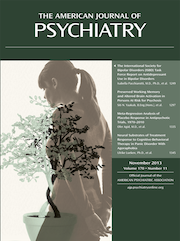Meta-Regression Analysis of Placebo Response in Antipsychotic Trials, 1970–2010
Abstract
Objective
Large placebo response presents a major challenge for psychopharmacologic drug development and contributes to the increasing failure of psychiatric trials. The objective of this meta-regression analysis was to identify potential contributors to placebo response in randomized controlled trials of antipsychotic treatment in schizophrenia.
Method
The authors extracted trial design and clinical variables from eligible randomized controlled trials (N=50) identified through searches of MEDLINE (1960–2010) and other sources. Standardized mean change (SMC) was used as the effect size measure for placebo response, based on change scores on the Brief Psychiatric Rating Scale or the Positive and Negative Syndrome Scale from baseline to endpoint (2 to 12 weeks).
Results
The results suggest significant heterogeneities (Q=387.83, df=49) in the magnitude of placebo response (mean SMC, −0.33, range −1.4 to 0.9) and in study quality. Both placebo SMC and study quality increased over time. Younger age, shorter duration of illness, greater baseline symptom severity, and shorter trial duration were significantly associated with greater placebo response, while country (United States compared with other countries) was not. More study sites, fewer university or Veterans Affairs treatment settings, and a lower percentage of patients assigned to receive placebo were associated with a greater placebo response, but these were not independent of publication year. Study quality affected the variability but not mean levels of placebo response.
Conclusions
This study identified important patient characteristics and trial design factors affecting the level of placebo response and hence the likelihood of detecting efficacy signals in randomized controlled trials. Future studies should test whether controlling these factors improves the detection of an antipsychotic effect.



